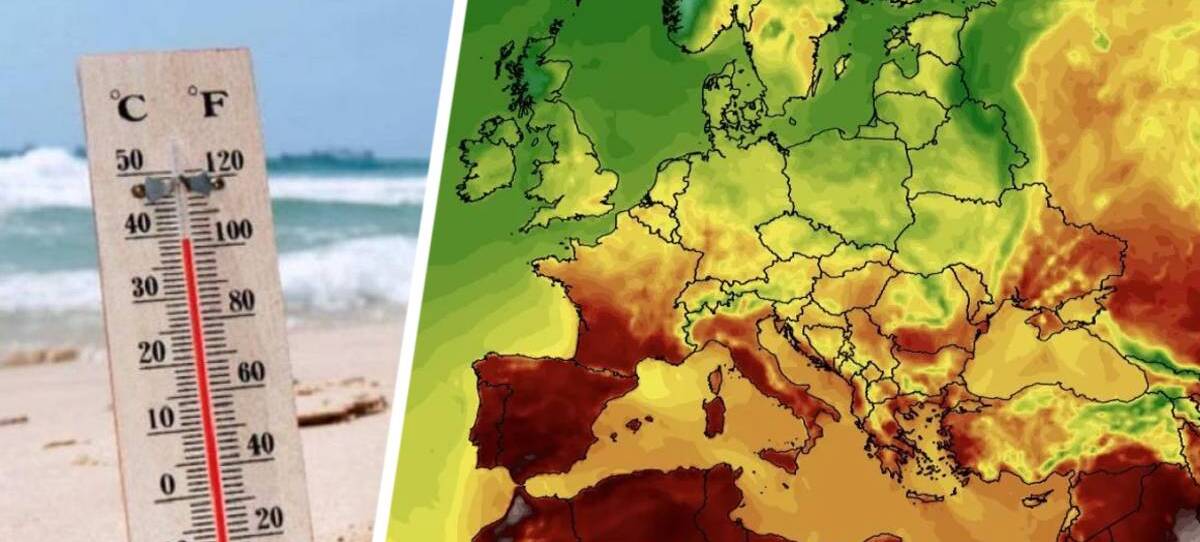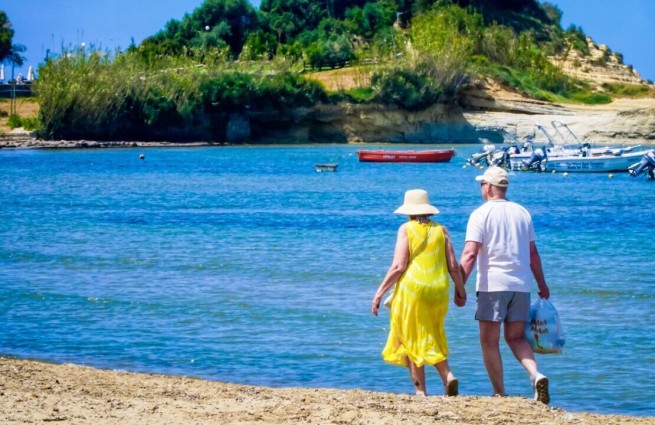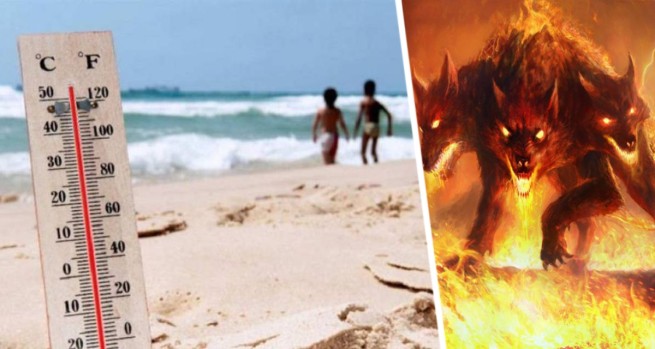Tourists now face a new situation when visiting warmer Mediterranean countries as countries are increasingly being battered by heat waves.
Heat waves that are affecting European countries due to the climate crisis are now becoming more frequent, which has a negative impact on tourism. Tourists are now faced with a new situation: Visits to warmer Mediterranean countries fell in 2023 due to record heatwaves and wildfires. This is how tourists choose destinations with a “milder climate”which are becoming increasingly popular, according to experts who spoke to CNN.
Indicative of the situation are Recent deaths and disappearances of tourists in Greecewho had a common pattern, going on hikes in the midst of high temperatures. Among them British TV presenter Michael Mosley, found dead on the island. Simi.
The problem of Southern Europe is the adaptation of tourists
Mary Betty Walsh, a tourist from Texas, thought she was used to high temperatures as her hometown of Dallas, which is currently suffering from unrelenting heat, often experiences heat waves. and was quite surprised at what she experienced in Hellas. The 21-year-old visited Athens in mid-June with her friends and told CNN she was shocked by the “unbearable” 37C heat she encountered.
“I actually had no idea how hot it was until we got there. This came as a big surprise to us“, – she said. “I always joke that I have such a high heat tolerance – in August (in the US) I take a sweatshirt with me to class“, – the girl added, but emphasized that the apartment where she stayed did not have air conditioning, and the temperature was very high. “Our energy levels were lower than we thought. Walking in the heat was completely unbearable” she said of how a group of young people got together to go on a hike.
As CNN notes, the extent to which the tourism industry and tourists can adapt to the increasing impacts of climate change is a growing challenge for southern European countries, many of which rely on tourism to boost their economies.
The climate crisis is changing the map of tourism
Many believe climate conditions may now further push tourism further north as extreme heat influences citizens' holiday decisions. Recent high temperatures have brought the climate crisis to the attention of some European holidaymakers.
“The climate crisis we feared will happen in 10 or 15 years here in some parts of the world. That's the worst thing“I'm not sure if I'm going to be able to do that,” Roo Clarke, 28, from Suffolk in eastern England, who currently lives with his girlfriend on the Greek island of Skyros, told CNN. Five years ago, my friends and I didn't even talk about it (climate change), but now it's becoming more and more of a topic of conversation.“.

According to CNN meteorologists, temperatures in Greece will fluctuate between +30-35°C over the next two weeks, which is several degrees above the summer averagewith the exception of one or two days of rain, during which the temperature will remain low.
Greek authorities have repeatedly warned tourists that Don't underestimate extreme heat, especially during the dayStefanos Sidiropoulos, who runs Greece's largest travel agency specializing in outdoor activities, says Tourists should not immediately begin active recreation. «People who come from Northern Europe or Canada, places with cooler temperatures, find it more difficult. They need time to adapt to these conditions” he told CNN.
The impact of climate change on where tourists go on holiday will have serious implications for some countries that rely on travellers for income. In Greece, tourism generates almost 38 billion euros, about 20% of the country's entire economy, according to the World Travel and Tourism Council.
In Italy, where the cities of Rome, Perugia and Palermo were recently placed under level three (highest) heat warnings, tourism accounts for 10% of the country's economy and one in eight jobs is linked to the industry, according to the latest figures.
According to the European Travel Commission (ETC), after summer heatwave in Europe in 2023, with thousands fleeing wildfires on the Greek island of Rhodes, concerns about climate change among European travellers rose by 7%This followed decrease in interest to holiday destinations in the southern Mediterranean in the summer of 2022-2023, with cooler destinations such as the Czech Republic, Bulgaria and Denmark became more attractiveETC told CNN.
“Travelers are becoming increasingly aware of extreme weather events and their potential impact on their holidays“Eduardo Santander, chief executive of ETC, told CNN, adding that in the future this could lead to more travelers visiting southern Europe in the spring and late autumn, instead of arriving here in the warm summer months. For now, Santander says tourists' concerns about climate change tend to be relatively short-lived. “Travelers get excited after the summer, but tend to forget about these events when planning their next vacation in the spring.“y,” he said.
Insects and mosquitoes
Extreme heat is one of the consequences of climate change affecting tourist destinations across Europe. But there are others. According to the European Center for Disease Prevention and Control (ECDC), Warmer conditions caused by climate change are pushing populations of disease-carrying mosquitoes into new areas of Europe. Clark emphasized that mosquito numbers were very high during the heat wave in early June.
The key mosquito species that can transmit dengue, chikungunya and Zika viruses, called Aedes albopictus, has now been detected in several European countries, including Greece, Italy, Portugal and Spain, according to the ECDC.
Andrea Amon, director of the ECDC, said travel could help expand the species' range. “Increased international travel from dengue-endemic countries will also increase the risk of imported cases“,” the statement said. Last year, ECDC recorded 130 cases of dengue in Europe, compared with 71 cases in 2022. No cases of dengue have been reported in Europe so far this summer, ECDC told CNN, but based on trends from last summer, they expect the first cases to be reported in the coming weeks.
According to ECDC, a human case of infection with West Nile virus, transmitted by Culex pipiens mosquitoes, was reported in the Seville province of Spain in March.

The tourism industry needs to think about adapting to climate change
Last summer's record temperatures around the world were caused by a combination of human-induced climate change and the return of the natural El Niño phenomenon, which causes global temperatures to rise. The combination has led to Temperatures have reached record levels in parts of Europe. But even though the impact El Nino is weakening, experts say the long-term trend of global warming will continue.
“Climate change is changing the odds so that more extreme events happen more often and then become more severe.“Rebecca Carter, director of climate change adaptation and resilience at the World Resources Institute, told CNN. She added that the large number of tourists in parts of Europe is putting pressure on already-stretched local authorities as they grapple with the need to protect residents from extreme heat while also protecting tourists.
Carter noted that the tourism industry needs to think about adapting to climate change.I don't think the travel industry thinks about it as much as it should“,” she said, adding that booking rules could be made more flexible, for example for flights and hotels.When people plan these trips, it is done weeks or months in advance, and it is impossible to predict when a particular location will experience extreme heat“,” the expert added.







More Stories
Cryptocurrency Price Increase – BluestoneMining
Tourism: Norwegians 'vote' for Greece
Prices for green electricity are “biting”